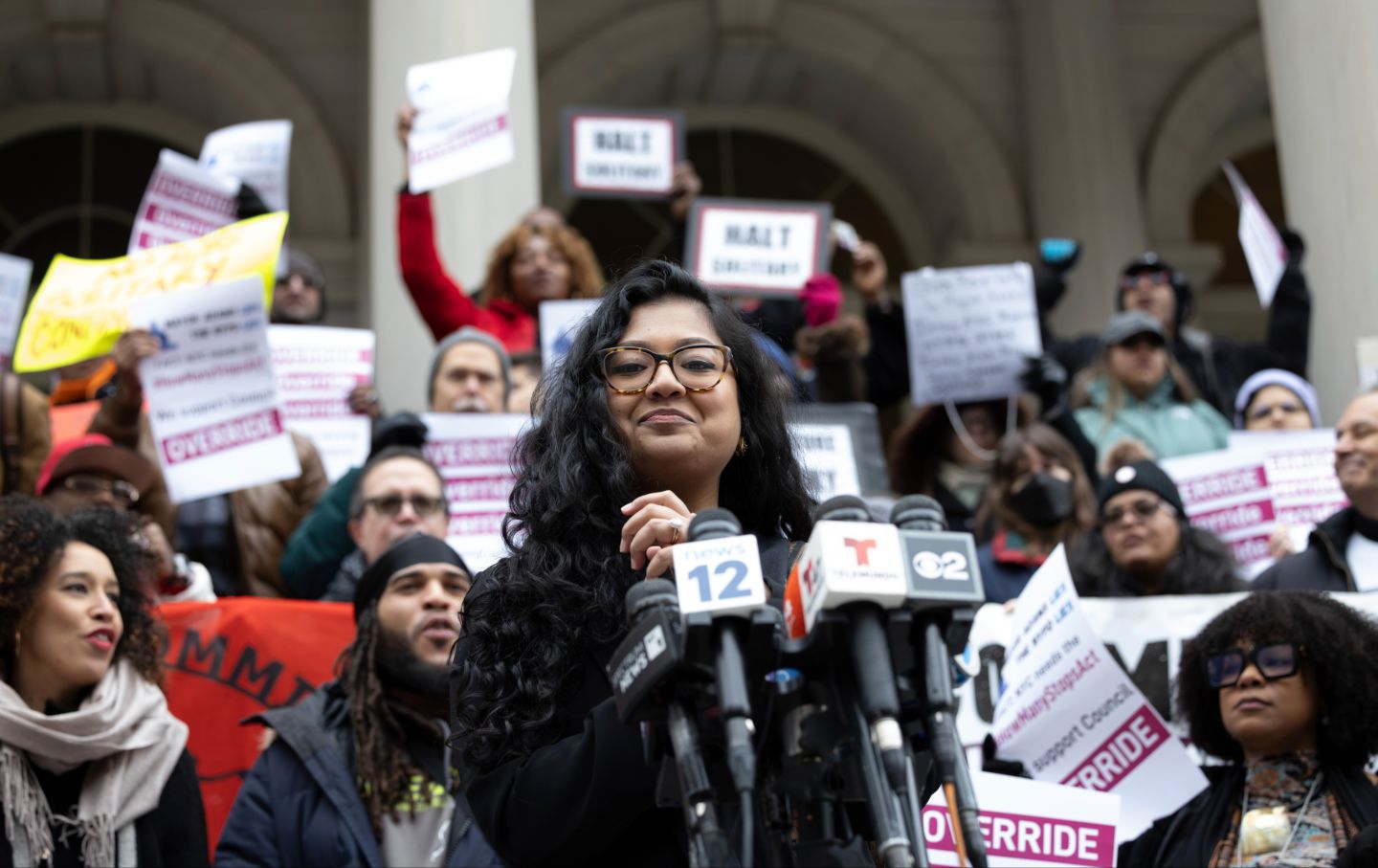
New York City Council member Shahana Hanif speaking at a rally at City Hall in New York City on January 30, 2024.
(Melissa Bender / NurPhoto via AP
Hundreds of thousands of dollars from real estate developers, finance executives, and the Israel lobby are flooding into New York City’s District 39 council race in an attempt to unseat Councilwoman Shahana Hanif.
Hanif, the daughter of Bangladeshi immigrants, grew up in Kensington—a neighborhood within her district known as Brooklyn’s Little Bangladesh—which is home to a large number of delivery workers and rideshare drivers. She has been an outspoken critic of the corporations funding her opponent, such as Uber, including sponsoring legislation that raised the minimum wage of drivers. She, would expand access to sick time, and would prevent deactivating drivers without just cause.
Elected in 2021, she became the first woman to represent the district and the first Muslim on the City Council. Now, she is at the center of a litmus test in New York politics: Can billionaires buy local elections and oust legislators with a proven progressive track record?
—Peter Lucas
Peter Lucas: New York City once boasted strong public programs like free college through CUNY and a robust transit system. But that’s since been rolled back, and the city is currently plagued by Eric Adams’s disinvestment and austerity. How are you fighting to govern differently?
Shahana Hanif: I’ve been an unapologetic opponent of Eric Adams’s austerity, and from him on down, leadership in our city is in crisis. Everything from housing to childcare and essential services feels very out of reach for everyday New Yorkers. It is evident that this administration doesn’t prioritize working people and families and is OK with peeling off investments from public schools, childcare, parks, and so much more.
As Progressive Caucus cochair, I believe that our fight on the City Council is to serve working families, ensure that we keep a check on the mayor, and invest in programs like Homes Now, Homes for Generation, which was one of our campaigns that revived two existing Housing Preservation & Development (HPD) programs for affordable housing. It is very clear that the mayor is not at all interested in the material needs of our constituents.
PL: Housing is a major part of your platform and the work that you’ve done in the office. Can you talk a little bit more about your approach to housing policy? And can we support policies that build more housing that is still affordable and accessible, instead of being an opportunity for real estate companies to line their pockets?
SH: New York City is in an affordable housing crisis and addressing the shortage of housing stock is critical. I’m not of the viewpoint that if it’s not all affordable, we can’t build anything. And I don’t think that this can be solved solely through market-rate development.
Take the Arrow Linen rezoning. It was a factory for restaurant linens, and after about a century, the family decided they were going to transition the building to residential, which required a change in zoning. We ended up securing a 10-story building with 100 affordable units out of 240 total. Not everyone is going to be a zoning law expert, but that shouldn’t exclude you from shaping how we solve this crisis.
PL: Another aspect of housing is tenant protections—things like rent control and enforcing fines on predatory and negligent landlords. How does that fit in?
SH: As a tenant organizer, I used to organize public housing residents at Queensbridge. In my position on the council, I’ve championed a rent freeze for rent-stabilized residents. With the Progressive Caucus, I helped introduce Chi Ossé’s FARE Act, which will change lives. I fight bad landlords in my district and encourage residents who reach out with an issue pertaining to their landlord to file a 3-1-1 case, because it’s crucial that those are lodged. We’ve been organizing to pass the Tenant Opportunity to Purchase Act and the Community Opportunity to Purchase Act.
We need to protect all rent-controlled housing stock. The Rent Guidelines Board, which the mayor appoints a majority of—under Adams, we have seen the rents spike. I want people to be able to stay in their homes and not have to choose between whether they’re saving for rent or childcare or groceries.
Another big issue with building affordable housing is that the agency that is tasked with that, HPD, is lagging. They are not a robust city agency that is going through all of the proposals that were approved for affordable housing because our administration has not prioritized fully funding and staffing it.
PL: You have the backing of major labor unions and workers’ rights groups in the city. In particular, you have been an advocate of delivery workers and Uber drivers. Why is it so important for you to have the backing of labor—and also to back labor?
SH: I grew up in Kensington—Brooklyn’s Little Bangladesh—which is made of majority working-class people, many of whom are Bangladeshi Muslims who drive and deliver all day just to be able to make rent, pay for groceries, and support their families. Their fights on the job have been my fights on the council, where I’ve pushed for the city to implement a fair minimum wage for drivers and delivery workers.
In 2021, I went on a hunger strike with the New York Taxi Workers Alliance, fellow City Council member Shekar Krishnan, and State Assembly Representative Zohran Mamdani [who is currently running for mayor]. Towards the end of the first week, we got arrested for civil disobedience, and I will never forget the hundreds of drivers who showed up in their taxis that day. These workers had been fighting for this for years, and I know people within the community who have suffered as a result of their debt, including those pushed to suicide. After 15 days, we secured millions in taxi medallion debt loan forgiveness.
Currently, we have a bill supporting restitution for the wages Uber stole from workers. I authored legislation that would expand paid sick time for gig workers. I have prioritized workers who have no legal status or are in the process, including the Workers’ Bill of Rights, which mandates that all employers in New York City provide their employees with strong labor protections. That legislation was supported by the Central Labor Council, which partnered with us even though the workers we are fighting for might not yet be unionized. My history of fighting for workers is something I’m very proud of, and it’s why 12 unions have endorsed me. My opponent doesn’t have one.
PL: Have you faced backlash for this?
SH: Uber has given my opponent a ton of money because of the paid sick time bill—and billionaires like James Dolan are spending big because of my legislation that would ban facial recognition technology at places of public accommodation [which Dolan instituted at Madison Square Garden].
But, beyond the specific legislation, my record a progressive who has championed things like affordable housing, workers’ rights and labor protections, and climate justice, also makes me a target.
PL: Former chair of the Committee on Immigration, you have been vocal about protecting immigrants, especially as attacks on them under Trump—in coordination with Adams—intensify. Can you tell me about your work on safeguarding immigrants’ rights, including the New York City Trust Act?
SH: I am the proud daughter of Bangladesh immigrants. My parents weren’t citizens when I was growing up, so the fight for immigrant rights is also my family’s story.
The New York City Trust Act, which now has 30 sponsors, is legislation that would allow for a private right of action for anyone who has been a victim of illegal collusion under our sanctuary laws. New York is a sanctuary city, but we’re still seeing ICE, with the help of local law enforcement and backing of our mayor, pick people up almost daily. It’s a massive rights violation, and hopefully this bill will stop the collusion.
PL: You were among the first city councilors to endorse the ceasefire in Gaza, and have continued to call for an end to the genocide. Some people might ask, why is it important for a local politician to comment on an international issue?
SH: I called for a bilateral ceasefire, and unfortunately since then, the violence has only gotten worse. Unlike other cities, New York has still not adopted a ceasefire resolution, which my colleagues and I pushed for. Why are we so scared to call for peace and recognize Palestinians as people? In my district, people of all faiths are concerned and want to see an end to the bloodshed. It’s also important to note that our money is funding this genocide. We desperately need a ceasefire, which means a release of all the hostages and the prevention of any more US dollars going to bomb Palestinian children.
PL: Again, we’ve seen this peak the interest of big money, particularly in the form of support from Israeli groups like Solidarity PAC.
SH: I’m not surprised. Their coalition is a right-wing Israeli PAC that wants to pit us against one another—and it includes people who have opposed progressive causes for years.
PL: A lot of the money is coming from people with a history of supporting the GOP, including Len Blavatnik, who donated a million dollars to Trump’s inaugural fund. Your opponent, ironically, has written about the influence of big money politics. What do you make of her willingness to accept their support and their eagerness to back her
SH: First of all, I’m embarrassed. My opponent has not once said anything about rejecting dark money or their connection to Republicans. The money that is being spent on her behalf really shows the interest of corporations and billionaires—including people with ties to the Trump administration.
Personally, I don’t know any billionaires. Our city deserves representatives who understand their struggles and will fight for them, not someone who is bought and sold by the very companies that exploit them.
She has presented herself as a pro-democracy candidate and spoken about money in politics, but her campaign’s finances reflect the opposite. So, as a constituent, I’m just confused. Who are you really? We need honest leaders, and right now, it’s really hard to see who she is.
PL: What is your campaign’s antidote to this cascade of corporate spending?
SH: I always try to make choices that bring people into our movement. We have a ton of volunteers, from “Jews for Shahana” to our Bangla operation in Kensington, and our grounded game is amazing. People know this is a high-stakes race, and I am so proud that the message we are sending is: We don’t want outside money, because no amount of money is going to stop us from fighting for a better, more compassionate city that supports workers, not squeezes them. Our coalition is big, diverse, and it’s one that can successfully fight back against Adams and Trump.
































